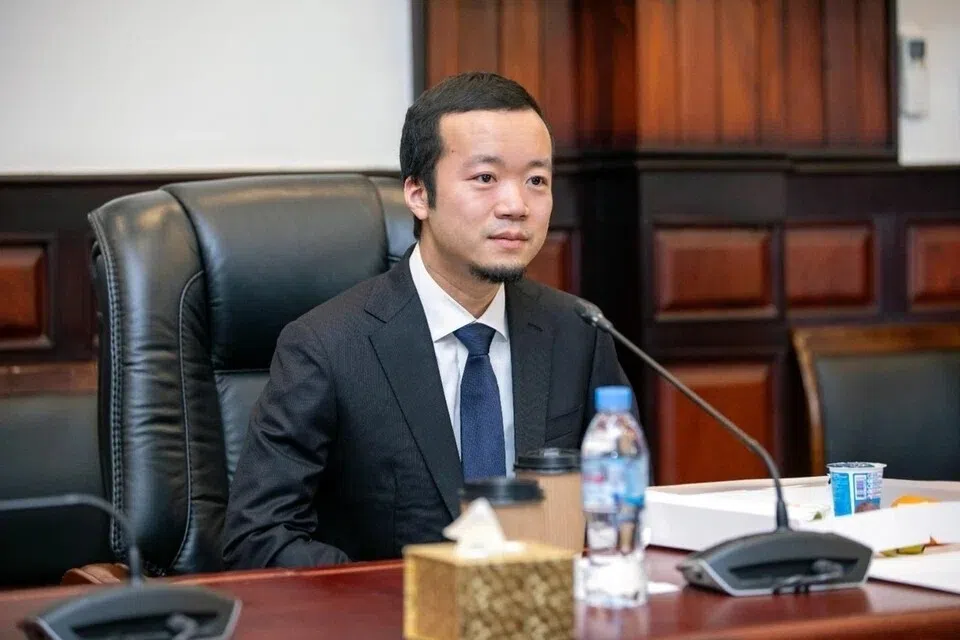S’pore police were already probing Prince Group’s Chen Zhi before US indictment: Chee Hong Tat
Sign up now: Get ST's newsletters delivered to your inbox

Cambodian tycoon Chen Zhi's whereabouts are currently unknown, but the police have said he is not in Singapore.
PHOTO: PRINCE HOLDING GROUP
Follow topic:
- Singapore was already investigating Chen Zhi and associates before US indictment, said National Development Minister Chee Hong Tat.
- Police advanced investigations after US sanctions, seizing assets over $150 million and probing linked family offices.
- Singapore takes an approach that balances risk management with maintaining jobs in wealth management, said Mr Chee.
AI generated
SINGAPORE - The police here were already investigating Cambodian tycoon Chen Zhi and his associates prior to his indictment in the US, said National Development Minister Chee Hong Tat on Nov 5.
Mr Chee, who is also deputy chairman of the Monetary Authority of Singapore (MAS), was responding to questions in Parliament about actions taken against Chen, who founded the now-sanctioned Prince Group
China-born Chen, 38, was indicted in the US on Oct 8 over alleged wire fraud and money laundering conspiracy, and for allegedly directing the operation of forced-labour scam compounds in Cambodia.
The charges were unsealed and made publicly known on Oct 14, with both the US and UK announcing sanctions against 146 entities, including Chen and Prince Group, on the same day.
Chen’s whereabouts are currently unknown, but the police have said he is not in Singapore.
Mr Chee said MAS has so far identified two single-family offices linked to Chen and his associates that had been granted tax incentives.
MAS has since ceased the tax incentives and investigations are ongoing.
Workers’ Party MP Kenneth Tiong (Aljunied GRC) had asked about Singapore’s family office regime and what due diligence checks MAS does before granting tax incentives, in relation to the sanctioned entities.
Mr Chee responded to his question and similar questions from other MPs on Nov 5, saying that Singapore upholds high standards in its financial system but there will still be some cases that slip through.
He said Singapore takes a risk-proportionate, and not zero-risk, approach.
Said Mr Chee: “There is a Chinese saying that when we open the windows, some flies may also enter.
“The solution is not to shut our windows and block out sunlight and fresh air. What matters is that we act swiftly to deal with the flies that enter, while also letting in sunlight and fresh air.”
He added that as at end-2024, there were 13,000 locals holding jobs in wealth management and private banking. Tightening processes further to the point that they become overly cumbersome may put these jobs at risk, he added.
Mr Tiong then said: “I think there are a lot of flies in the house.”
Mr Chee said: “I don’t know which house Mr Tiong is referring to, but as far as we are aware, in the house of Singapore, we do not have many flies.”
Mr Chee said that less than 1 per cent of single-family offices here turn out to be bad actors involved in money laundering. He added: “This doesn’t mean that there are many, many flies in this house.”
During the exchange, Mr Tiong commented that a question Mr Chee had asked him was “stupid”.
Speaker of Parliament Seah Kian Peng said he was disappointed with Mr Tiong’s conduct. Mr Tiong then apologised to Mr Chee, who accepted his apology.
As for Chen and Prince Group, Mr Chee said he was unable to comment further due to ongoing investigations.
On Oct 31, Singapore police said they had received financial intelligence from the Suspicious Transaction Reporting Office, which is the country’s financial intelligence unit, regarding Chen and his associates in 2024, and had already been investigating them.
With the information from the US and UK press releases, the police here were able to advance their investigations.
On Oct 30, they mounted an islandwide enforcement operation against Chen and his associates in relation to offences of money laundering and forgery.
The authorities seized and issued prohibition of disposal orders against six properties and various financial assets, including bank accounts, securities accounts and cash, with a total estimated value of more than $150 million
Other assets, including a yacht, 11 cars and multiple bottles of liquor, were also subjected to prohibition of disposal orders.
Multiple jurisdictions have been moving against Chen and Prince Group in recent weeks, seizing a variety of assets.
Three Singaporeans and 17 Singapore-registered entities
In a statement on Oct 14, the US Treasury Department’s Office of Foreign Assets Control said these individuals and entities have been added to its Specially Designated Nationals and Blocked Persons list.
This effectively bars US persons from conducting any transactions with them and requires the blocking of any property in their possession or under their control.
The US has so far seized almost 130,000 bitcoins, worth a total of around US$15 billion (S$19.6 billion), linked to Prince Group.
The UK has seized at least 19 properties in London, including one worth nearly £100 million (S$170 million).
On Nov 4, Taipei prosecutors said they had detained 25 people and seized NT$4.5 billion (S$190.2 million) in assets tied to the Prince Group
The same day, the Hong Kong authorities said they had frozen assets worth HK$2.75 billion (S$462 million)


